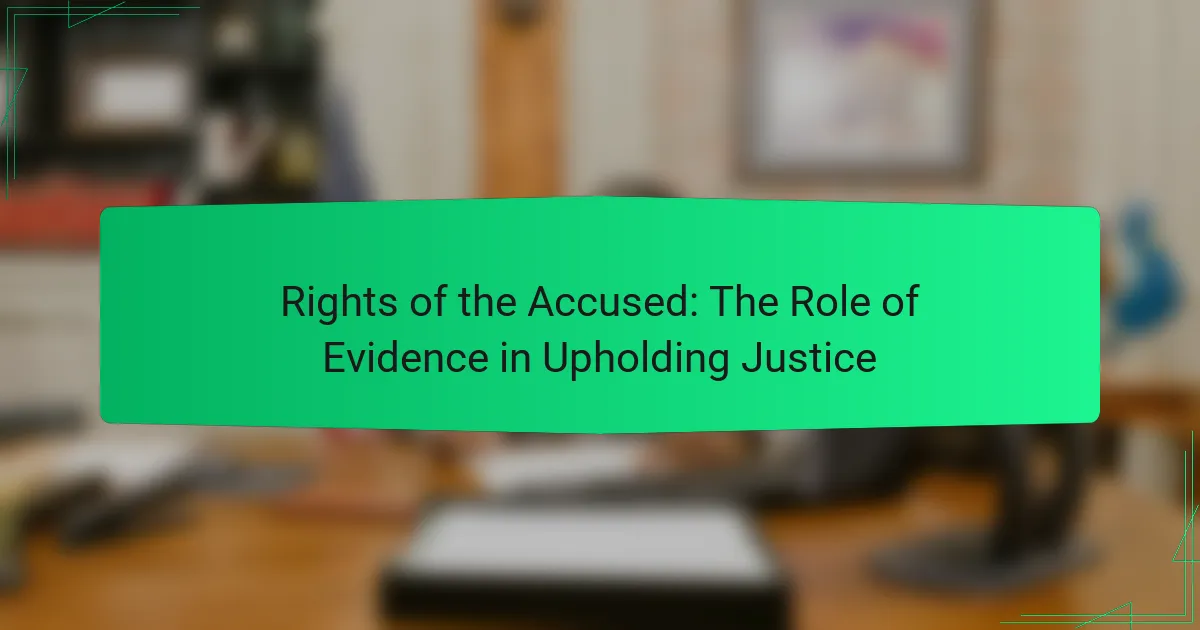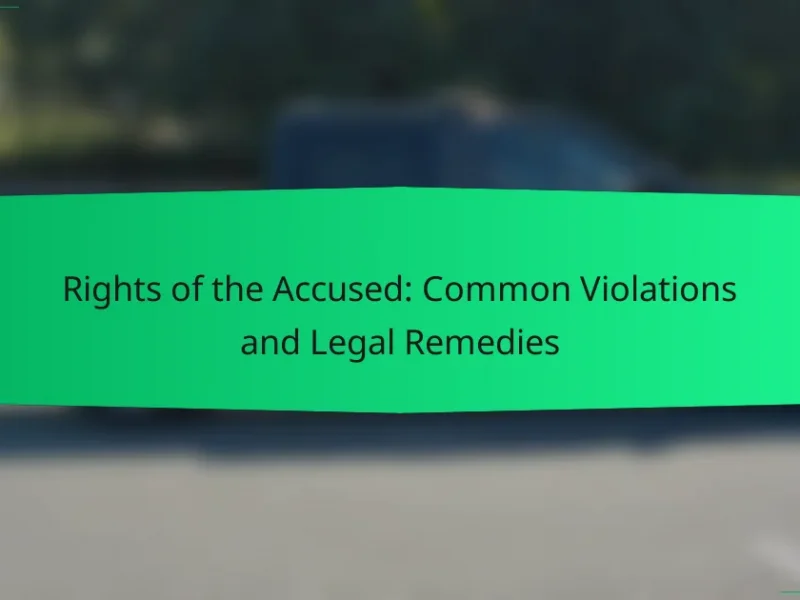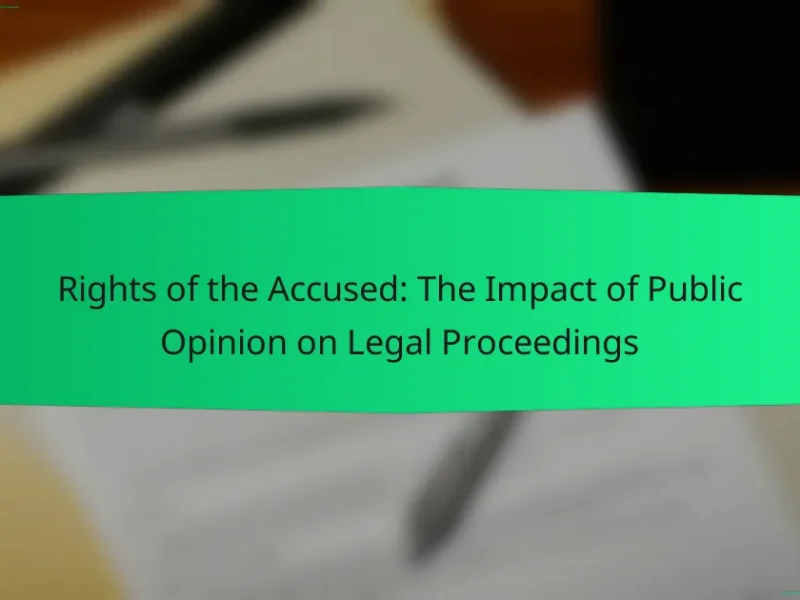The rights of the accused are essential legal protections that ensure fairness in the judicial process. Key rights include the right to a fair trial, the right to remain silent, and the right to legal counsel, as enshrined in the Sixth and Fifth Amendments of the U.S. Constitution. Challenges such as limited access to legal representation and biases within the judicial system can impede these rights, potentially leading to wrongful convictions. Effective upholding of these rights requires competent legal counsel, adherence to due process, and transparency in evidence handling, all of which contribute to maintaining justice and trust in the legal system.
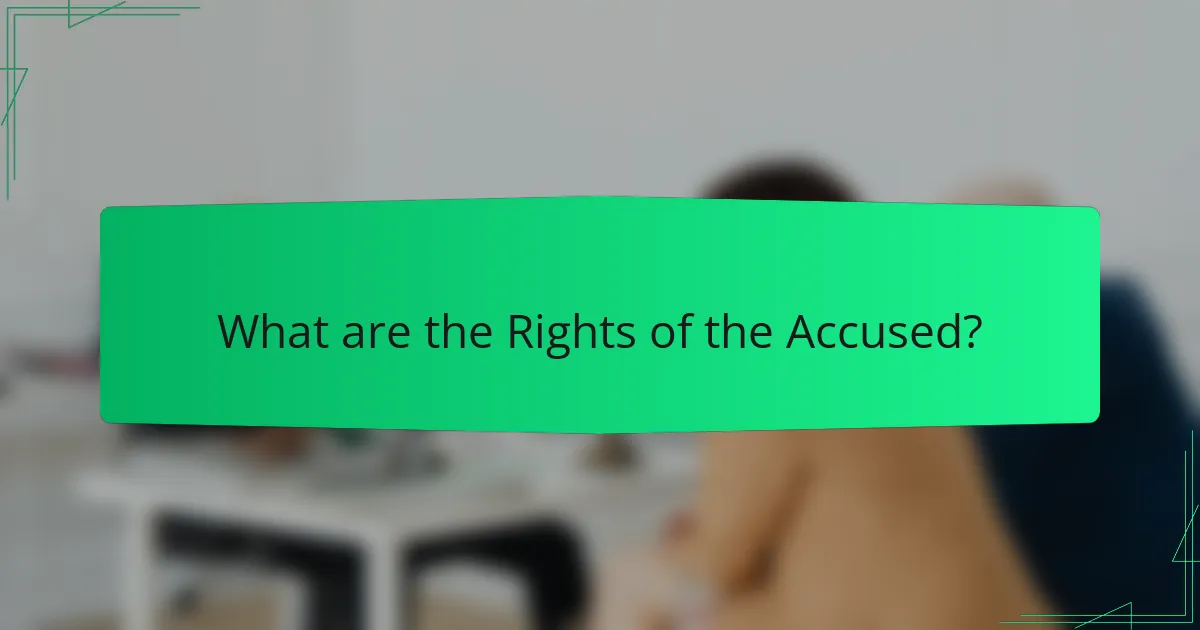
What are the Rights of the Accused?
The rights of the accused include the right to a fair trial, the right to remain silent, and the right to legal counsel. These rights are fundamental to ensuring justice in the legal system. The Sixth Amendment of the U.S. Constitution guarantees the right to a speedy and public trial by an impartial jury. Additionally, the Fifth Amendment provides protection against self-incrimination. The accused also has the right to confront witnesses and to present evidence in their defense. These protections are designed to prevent wrongful convictions and uphold the integrity of the judicial process.
Why are the Rights of the Accused important in the justice system?
The Rights of the Accused are crucial in the justice system because they ensure fair treatment and protect against wrongful conviction. These rights include the presumption of innocence, the right to a fair trial, and the right to legal representation. Such protections help maintain public confidence in the legal system. They also prevent abuse of power by authorities. For instance, the Sixth Amendment of the U.S. Constitution guarantees the right to counsel. This right allows defendants to have legal assistance, which is essential for a fair defense. Studies show that access to legal representation significantly influences trial outcomes. Thus, the Rights of the Accused are foundational to justice and equality before the law.
What historical context shaped the Rights of the Accused?
The historical context that shaped the Rights of the Accused includes the development of legal principles aimed at protecting individuals during criminal proceedings. Key influences include the Magna Carta of 1215, which established the idea of due process. This document limited the power of the monarchy and affirmed that no free man could be imprisoned without a lawful judgment. The Enlightenment era further contributed to these rights, emphasizing individual liberties and rational legal processes. Philosophers like John Locke and Montesquieu advocated for fair trials and the presumption of innocence. Additionally, the U.S. Constitution and the Bill of Rights enshrined these principles, particularly the Sixth Amendment, which guarantees the right to a fair trial. Historical injustices, such as wrongful convictions and abuses of power, also prompted reforms to safeguard the rights of the accused. These developments collectively laid the foundation for modern legal protections.
How do these rights protect individuals during legal proceedings?
These rights protect individuals during legal proceedings by ensuring fair treatment and safeguarding against abuses. They guarantee the right to legal representation, allowing individuals to have an advocate who can navigate the complexities of the law. The right to remain silent prevents self-incrimination, ensuring that individuals cannot be compelled to provide evidence against themselves. Additionally, the right to a public trial ensures transparency and accountability in the judicial process. These protections help maintain the presumption of innocence, a fundamental principle that individuals are considered innocent until proven guilty. Statistics show that jurisdictions with strong protections for the accused have lower rates of wrongful convictions. Such rights also provide mechanisms for appeals and reviews, allowing errors to be corrected. Overall, these rights are essential for upholding justice and protecting individual liberties within the legal system.
What key rights are granted to the Accused?
The key rights granted to the accused include the right to a fair trial, the right to remain silent, and the right to legal counsel. The right to a fair trial ensures that the accused is judged by an impartial jury. The right to remain silent protects the accused from self-incrimination. The right to legal counsel guarantees access to a lawyer for defense. These rights are foundational to the justice system and are enshrined in legal frameworks such as the Sixth Amendment in the United States Constitution. This amendment specifically outlines these rights, reinforcing their importance in upholding justice for the accused.
Which rights ensure fair trial standards for the Accused?
The rights that ensure fair trial standards for the accused include the right to legal counsel, the right to a public trial, and the right to an impartial jury. The right to legal counsel guarantees that the accused can have an attorney present during proceedings. This is essential for adequate defense representation. The right to a public trial helps maintain transparency in the judicial process. It allows the public to observe the proceedings, which can deter misconduct. The right to an impartial jury ensures that the jury is unbiased and represents a cross-section of the community. This protects against prejudice in the trial. These rights are supported by legal frameworks such as the Sixth Amendment of the U.S. Constitution.
How do rights against self-incrimination and double jeopardy function?
Rights against self-incrimination protect individuals from being compelled to testify against themselves in criminal cases. This means that a defendant cannot be forced to provide evidence or statements that could lead to their own conviction. The Fifth Amendment of the U.S. Constitution guarantees this right.
Double jeopardy prevents an individual from being tried twice for the same offense. This means that once a person has been acquitted or convicted of a crime, they cannot face prosecution again for that same crime. The Double Jeopardy Clause is also found in the Fifth Amendment.
Both rights serve to protect individuals from government overreach and ensure fair legal processes. They contribute to the principle of legal finality, which upholds the integrity of judicial outcomes.
How does evidence play a role in the Rights of the Accused?
Evidence is fundamental in protecting the Rights of the Accused. It ensures that legal proceedings are based on factual information. The presence of evidence supports the presumption of innocence until proven guilty. It allows the accused to challenge claims made against them. The burden of proof lies with the prosecution, requiring them to present credible evidence. This principle is enshrined in legal systems, such as the Sixth Amendment in the U.S. Constitution. Evidence also plays a role in ensuring fair trials by allowing for cross-examination. The integrity of the justice system relies on the proper handling and presentation of evidence.
What types of evidence are admissible in court?
Admissible evidence in court includes testimonial, documentary, physical, and demonstrative evidence. Testimonial evidence consists of witness statements under oath. Documentary evidence includes written documents, such as contracts and emails. Physical evidence refers to tangible items, like weapons or clothing. Demonstrative evidence involves models, diagrams, or simulations used to illustrate facts. Each type must comply with legal standards to be considered valid in court. The Federal Rules of Evidence govern these standards, ensuring relevance and reliability.
How does the burden of proof affect the Accused’s rights?
The burden of proof significantly impacts the rights of the accused. It establishes that the prosecution must prove the accused’s guilt beyond a reasonable doubt. This standard protects the accused from wrongful conviction. It ensures that they are presumed innocent until proven guilty. The burden of proof limits the prosecution’s power and safeguards individual liberties. It requires that evidence presented against the accused is credible and substantial. This principle is foundational in criminal justice systems, emphasizing fairness. It reinforces the accused’s right to a fair trial and due process.
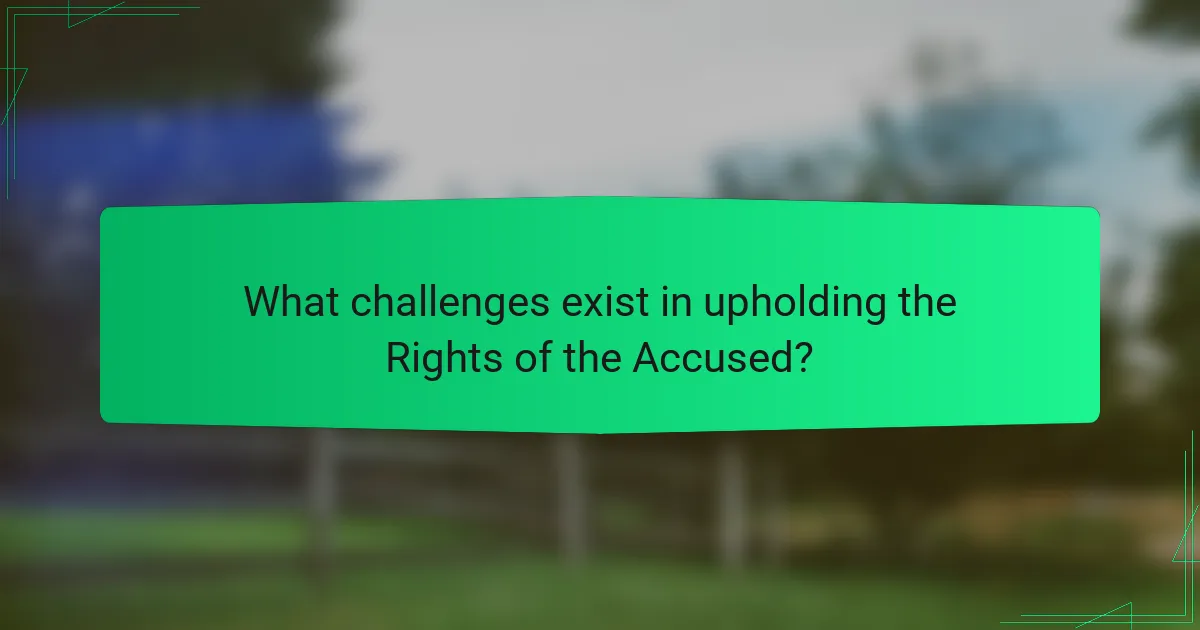
What challenges exist in upholding the Rights of the Accused?
Challenges in upholding the Rights of the Accused include limited access to legal representation and insufficient resources for defense. Many accused individuals cannot afford an attorney, leading to inadequate defense. Overburdened public defenders often lack the time to prepare cases thoroughly. Additionally, biases in the judicial system can influence outcomes. Prejudicial media coverage may affect jury perceptions. Furthermore, procedural complexities can hinder the accused’s ability to navigate the legal system effectively. These challenges collectively impede the fair treatment of individuals facing charges.
How can evidence be misused against the Accused?
Evidence can be misused against the accused through various means. One common method is the presentation of misleading or incomplete information. This can occur when evidence is taken out of context, altering its intended meaning. Additionally, evidence may be fabricated or tampered with, leading to false conclusions.
Improper handling or storage of evidence can also compromise its integrity. In some cases, law enforcement may rely on coerced confessions or witness statements that are unreliable. Furthermore, biases in the legal system can result in selective use of evidence that favors the prosecution.
These practices undermine the accused’s right to a fair trial. Historical instances, such as the wrongful convictions highlighted in the Innocence Project, illustrate the consequences of misusing evidence. Such cases emphasize the importance of maintaining strict protocols in evidence collection and presentation to uphold justice.
What are the implications of wrongful convictions related to evidence?
Wrongful convictions related to evidence can lead to severe implications for individuals and the justice system. Innocent people may spend years in prison due to flawed evidence. This undermines public trust in the legal system. Studies show that DNA evidence has exonerated over 375 wrongfully convicted individuals in the U.S. since 1989. Additionally, wrongful convictions can result in emotional and psychological trauma for the wrongfully accused. Victims of wrongful convictions often face social stigma and difficulties reintegrating into society. The financial burden on the state increases due to wrongful imprisonment and subsequent legal costs for exoneration. Ultimately, these implications highlight the critical need for accurate evidence handling and evaluation in the justice process.
How do biases in evidence collection impact the Accused?
Biases in evidence collection can significantly harm the accused. These biases may lead to the gathering of misleading or incomplete evidence. For instance, confirmation bias can cause investigators to focus on information that supports their initial assumptions. This can result in overlooking exculpatory evidence that may favor the accused. Additionally, biases can skew the interpretation of evidence. When evidence is interpreted through a biased lens, it may unfairly influence the legal proceedings against the accused. Research shows that biased evidence collection can contribute to wrongful convictions. According to the Innocence Project, more than 70% of wrongful convictions involve misidentification, which often stems from biased evidence collection practices. Thus, biases in evidence collection undermine the fairness of the judicial process and jeopardize the rights of the accused.
What are the consequences of violating the Rights of the Accused?
Violating the Rights of the Accused can lead to severe legal repercussions. Such violations may result in the dismissal of charges against the accused. Courts often exclude evidence obtained through unlawful means. This exclusionary rule protects the integrity of the judicial process. Additionally, law enforcement officials may face disciplinary action or civil liability. The public’s trust in the justice system can also diminish. Historical cases, such as Miranda v. Arizona, highlight these consequences. This landmark case established the necessity of informing suspects of their rights, reinforcing the importance of adherence to these rights.
How do such violations affect the integrity of the justice system?
Violations of rights within the justice system undermine its integrity. Such violations can lead to wrongful convictions and mistrials. They erode public trust in legal institutions. When evidence is mishandled, it compromises the fairness of trials. Historical cases illustrate this effect, such as the wrongful conviction of the Central Park Five. Their convictions were based on coerced confessions and flawed evidence. This led to significant public outcry and calls for reform. Ensuring the protection of rights is vital for maintaining justice system credibility.
What remedies are available for the Accused when rights are violated?
The accused have several remedies when their rights are violated. These remedies include the right to appeal, which allows the accused to challenge a conviction or sentence. Additionally, the accused can seek a motion to suppress evidence obtained unlawfully. This motion can prevent illegally obtained evidence from being used in court. Furthermore, the accused may file a civil lawsuit for damages due to rights violations. This legal action can address harm caused by unlawful actions. Lastly, the accused can request a mistrial if procedural errors significantly affect the trial’s fairness. Each of these remedies aims to protect the rights of the accused and uphold justice.
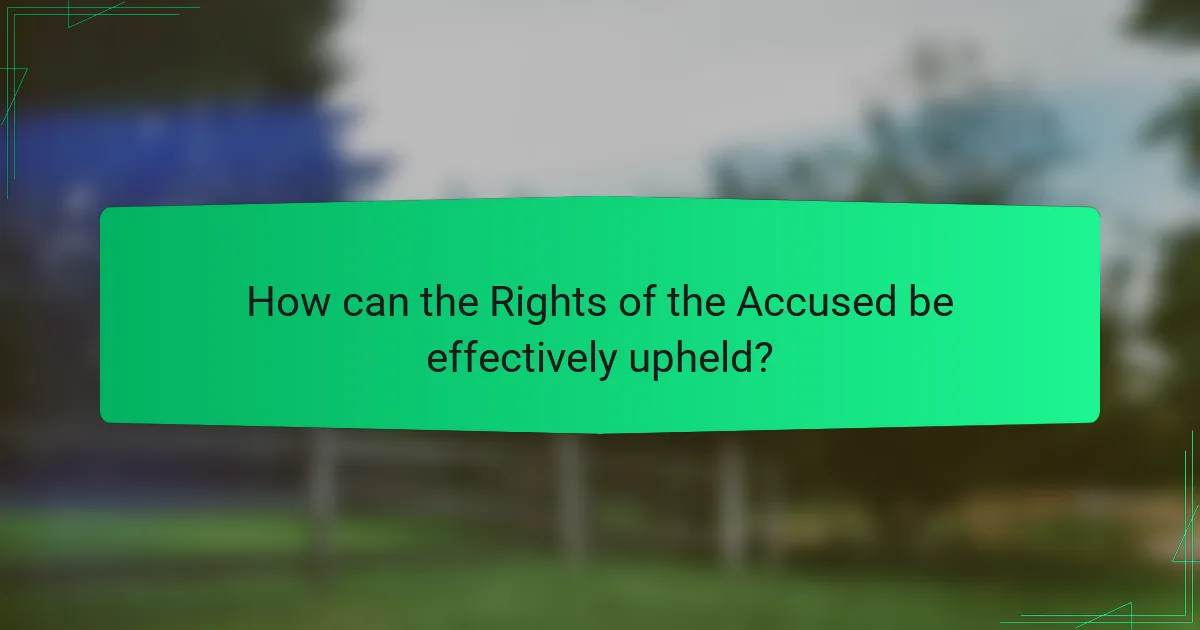
How can the Rights of the Accused be effectively upheld?
The rights of the accused can be effectively upheld through legal representation and fair trial procedures. Access to competent legal counsel ensures that defendants understand their rights and the legal process. Courts must adhere to due process, which includes timely hearings and impartial judges. Transparency in evidence collection and presentation is crucial. This prevents wrongful convictions and promotes trust in the justice system. Legal safeguards, such as the presumption of innocence, further protect the accused. According to the Sixth Amendment of the U.S. Constitution, the accused has the right to a speedy and public trial. Upholding these rights contributes to a fair and just legal system.
What best practices can legal professionals adopt to protect the Accused’s rights?
Legal professionals can adopt several best practices to protect the rights of the Accused. They should ensure that the Accused is informed of their rights upon arrest. This includes the right to remain silent and the right to legal counsel. Legal professionals must also provide competent representation throughout the legal process. They should gather and present all relevant evidence to support the Accused’s case. Additionally, they must challenge any unlawful evidence obtained during the investigation. Maintaining confidentiality of the Accused’s information is crucial. Legal professionals should also educate the Accused about the legal process and their options. These practices help uphold justice and protect the rights of the Accused effectively.
How can training and education improve adherence to these rights?
Training and education can significantly improve adherence to the rights of the accused. They provide legal professionals with a comprehensive understanding of these rights. This knowledge helps ensure that rights are respected during legal proceedings. Training programs can include workshops, seminars, and online courses focused on legal standards. Educational materials can highlight case studies and real-life scenarios. These resources reinforce the importance of upholding justice. Research indicates that informed legal practitioners are more likely to comply with legal standards. For instance, a study by the American Bar Association found that ongoing education leads to better legal practices. This ultimately enhances the protection of the rights of the accused.
What role does public awareness play in safeguarding the Rights of the Accused?
Public awareness plays a crucial role in safeguarding the Rights of the Accused. It ensures that the general public understands the legal protections afforded to individuals facing charges. Increased awareness can lead to greater scrutiny of law enforcement practices. This scrutiny helps prevent abuses of power and wrongful convictions. Public knowledge encourages advocacy for fair treatment within the justice system. Research indicates that communities informed about legal rights are more likely to demand accountability. For example, campaigns highlighting the presumption of innocence can influence public opinion and judicial processes. Ultimately, informed citizens can act as a check on the system, promoting justice and fairness.
How can advocacy groups influence policy regarding the Accused’s rights?
Advocacy groups can influence policy regarding the Accused’s rights by lobbying for legislative changes. They conduct research to highlight the importance of protecting these rights. Advocacy groups often mobilize public opinion through campaigns and awareness initiatives. They engage with policymakers to present evidence and case studies. These groups may also file amicus briefs in court to support legal arguments. They collaborate with legal experts to draft proposed legislation. Furthermore, advocacy groups can provide testimony during legislative hearings. Their efforts can lead to reforms that enhance the rights of the Accused.
What practical steps can individuals take to understand their rights as Accused?
Individuals can take several practical steps to understand their rights as accused. First, they should familiarize themselves with local laws regarding criminal procedures. Reading the relevant statutes can provide essential insights into legal rights. Second, individuals should consult with a qualified attorney who specializes in criminal law. An attorney can explain rights in detail and provide personalized guidance. Third, they can access resources from legal aid organizations. These organizations often provide educational materials that clarify rights. Fourth, attending workshops or seminars on legal rights can be beneficial. Such events often feature legal experts who discuss the rights of the accused. Finally, individuals should remain informed about any changes in laws that affect their rights. Keeping up with legal news can help ensure awareness of rights is current.
The main entity of the article is the “Rights of the Accused,” which are fundamental legal protections ensuring fair treatment in the justice system. The article outlines key rights such as the right to a fair trial, the right to remain silent, and the right to legal counsel, emphasizing their importance in preventing wrongful convictions. It explores the historical context that shaped these rights, the role of evidence in legal proceedings, and the challenges faced in upholding these rights. Additionally, it discusses the implications of violations, the impact of biases in evidence collection, and the significance of public awareness and advocacy in safeguarding the rights of individuals accused of crimes.
